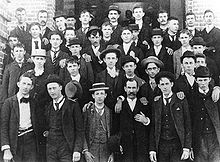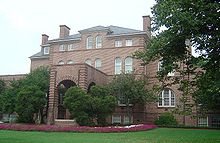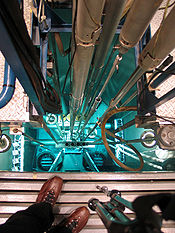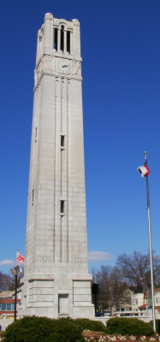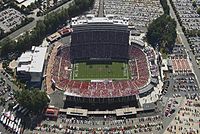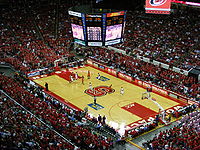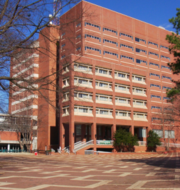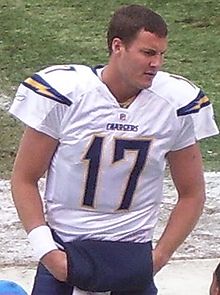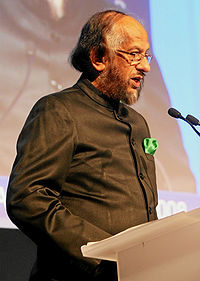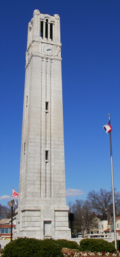- North Carolina State University
-
Coordinates: 35°47′08″N 78°40′18″W / 35.785548°N 78.67157°W
North Carolina State University at Raleigh 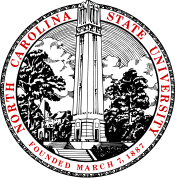
Established March 7, 1887 Type Land-grant university
Sea-grant university
Space-grant university
PublicEndowment $503 million[1] Chancellor William Randolph "Randy" Woodson Academic staff 2,073 Admin. staff 5,341 Undergraduates 23,636 Postgraduates 8,267 Location Raleigh, North Carolina, United States Campus Urban
2,110 acres (8.5 km2)Former names North Carolina College of Agriculture and Mechanic Arts and North Carolina State College Colors Red and white
[2]Athletics NCAA Division I FBS
24 varsity sportsNickname Wolfpack Website www.ncsu.edu [3] North Carolina State University at Raleigh[4] (NCSU) is a public, coeducational, extensive research university located in Raleigh, North Carolina, United States.[5] Commonly known as NC State, the university is part of the University of North Carolina system and is a land,[6] sea,[7] and space grant institution.[8] The university forms one of the corners of the Research Triangle in addition to Duke University in Durham and The University of North Carolina at Chapel Hill.
The North Carolina General Assembly founded the North Carolina College of Agriculture and Mechanic Arts, now NC State, on March 7, 1887, as a land-grant college. Today, NC State has an enrollment of more than 33,000 students, making it the largest university in North Carolina. While NC State has historical strengths in agriculture, life sciences, design, engineering and textiles, it offers 115 bachelor's degrees. The university is nationally acclaimed for its academic prestige and commitment to student development. The Center for Student Leadership, Ethics, & Public Service is the university's premiere center dedicated to developing cultured students. The graduate school offers more than 100 areas of study leading to 169 master's, 69 doctoral degrees, and a Doctor of Veterinary Medicine.[9]
Contents
History
Main article: History of North Carolina State UniversityThe North Carolina General Assembly founded NC State on March 7, 1887 as a land-grant college under the name "North Carolina College of Agriculture and Mechanic Arts." As a land-grant college, NC State would provide a liberal and practical education while focusing on military tactics, agriculture and the mechanical arts without excluding classical studies. Since its founding, the university has maintained these objectives while building on them.[10]
After opening in 1889, NC State saw its enrollment fluctuate and its mandate expand. During the Great Depression, the North Carolina government headed by Governor Oliver Max Gardner, administratively combined the University of North Carolina at Chapel Hill, the Women's College at Greensboro, and NC State. This conglomeration became the University of North Carolina in 1971. After World War II, the university has constantly grown and changed.[citation needed] In the summer of 1956, North Carolina State University enrolled its first African-American undergraduates, Edward Carson and Manuel Crockett.[10]
In 1966, single year enrollment reached 10,000.[10] The 1970s saw enrollment surpass 19,000 and the addition of the School of Humanities and Social Sciences. NC State celebrated its centennial in 1987 and reorganized its internal structure renaming all its schools to colleges (e.g. School of Engineering to the College of Engineering). Also in this year, it gained 700 acres (2.8 km2) of land that would later become the Centennial Campus. During the next decade and a half and continuing today, NC State has focused on developing its new Centennial Campus. Over $620 million has been invested in facilities and infrastructure at the new campus with 62 acres (0.3 km2) of space being constructed. There are also 61 private and government agency partners located on Centennial Campus.[11]
Currently, NC State has almost 8,000 employees, over 31,000 students, a $1.01 billion annual budget, and a $535 million endowment. It is the largest university in the state and one of the anchors of North Carolina's Research Triangle, together with Duke University and the University of North Carolina at Chapel Hill.[12][13]
Campuses
Main Campus
Main article: Main Campus of North Carolina State UniversityNC State's Main Campus has three sub-campuses: North Campus, Central Campus, and South Campus. North Campus is the oldest part of NC State and is home to most academic departments and a few residence halls. Central Campus is primarily composed of residence halls, cafeterias, gymnasiums and student support facilities. Finally, Greek Court, the McKimmon Conference and Training Center, and student park-and-ride areas are found on South Campus. North and Central Campus are separated by the North Carolina Railroad. Pedestrian tunnels allow students to commute between campuses. Central and South Campuses are separated by Western Boulevard, a major downtown artery. University Housing divides Main Campus into West, Central, and East Campus for residence hall purposes. West and Central campuses are divided by Dan Allen Drive, while Central and East are divided by Morill Drive and Reynolds Coliseum.[14]
Architecturally, Main Campus is known for its distinctive red brick buildings. Because of oversupply, odd brick statues dot the landscape, the University Plaza, colloquially named "The Brickyard", in Central Campus is nicknamed for its paving material, and most sidewalks are also made from brick. The Brickyard and sidewalks also sporadically contain white brick mosaics and other patterns.[15]
The Memorial Bell Tower, located in the Northeast corner of North Campus, serves as the signature of NC State and appears in the NC State Official Seal. It was constructed as a monument to alumni killed in World War I. The granite tower, completed in 1937, is 115 feet (35 m) tall. As a tradition, the Bell Tower is lit in red at night immediately following athletic victories and certain academic achievements.[16] The Bell Tower, however, does not actually have a bell; The carillon system that can be heard ringing from the bell tower is actually housed in nearby Holladay Hall.
The Court of North Carolina, just West of the Memorial Bell Tower, is surrounded by the 1911 Building; the College of Humanities and Social Sciences in Tompkins, Caldwell, Winston Halls and The College of Education in Poe Hall; Page Hall, home to College of Engineering offices; and Leazar Hall, former location of the Computer Science Teaching Labs. It was once home to 100 trees (one for every county in North Carolina), but damage caused by Hurricane Fran in 1996 reduced the number significantly, including the destruction of a particularly old and large tree which was some 12 feet (3.7 m) in diameter. Some replanting has occurred, but the Court's former appearance is far from being restored.[17]
Southwest of the Court of North Carolina is another landmark, the Free Expression Tunnel. The Tunnel functions as one of three pedestrian tunnels underneath the railroad tracks separating North Campus and Central Campus. This particular tunnel is the site of sanctioned graffiti; anyone may paint there, and it is often the place for political statements, personal messages, and art.[18][19]
Centennial
Main article: Centennial Campus of North Carolina State UniversityNC State's main campus is augmented by the 1,334-acre (5.4 km2) mixed-use Centennial Campus. Located 1 mi (1.6 km) south of the Memorial Bell Tower, this campus houses university, corporate, and government research, in addition to classrooms and non-student residences. The College of Textiles has been based on this campus since 1991. Beginning in 2002, the College of Engineering began to relocate to Centennial Campus. Currently, six of the nine College of Engineering departments are housed in three Engineering Buildings in an area known as the Engineering Oval. The Golden LEAF Biomanufacturing Training and Education Center (BTEC), part of the College of Engineering, is located adjacent to the Engineering Oval. The offices of Red Hat, ABB, and the National Weather Service are also on the Centennial Campus, as well as Centennial Campus Magnet Middle School.[20]
Centennial Biomedical Campus
The North Carolina State University Centennial Biomedical Campus is located 2.5 mi (4.0 km) west of the Memorial Bell Tower. The campus is anchored by North Carolina State University College of Veterinary Medicine--NC State's professional college and North Carolina's only veterinary medicine program. The 180-acre (0.73 km2) campus consists of 20 buildings including the 100,000-square-foot (9,300 m2) CVM Research Building where biomedical investigations in genomic sciences; vaccine development; cancer immuno-therapy; emerging and infectious zoonotic diseases; and diseases of the lung, respiratory track, skin, and digestive system are undertaken. The Center for Comparative Medicine and Translational Research, the Veterinary Teaching Hospital with its clinical research and clinical trials, and the Teaching Animal Unit (TAU), which is a working farm, are also campus elements. The Randall B. Terry, Jr. Companion Animal Veterinary Medical Center will more than double the size of the current hospital when completed in late 2010-early 2011.
J. C. Raulston Arboretum is an 8-acre (0.03 km2) arboretum and botanical garden operated by NC State, and located just south of West Campus. It is open daily without charge.[21]
Sustainability
In March 2008, NC State launched the University Sustainability Office to address environmental concerns on campus and includes a Director of Sustainability, a Sustainability Outreach Coordinator, a Sustainability Program Coordinator, and a Sustainability Student intern.[22] NC State has established a commitment to reduce its annual energy consumption per square foot by at least 4% over a 10 year period.[23] In addition, the university has surpassed the Executive Order 156 goal of diverting 40 percent of their solid waste stream from the landfill through a variety of campus reuse and recycling programs.[23] NC State incorporates locally grown, organic, and free range foods into dining service meals at several events such as Earth Week’s EarthFest and the annual All Carolinas Meal with foods local to the Carolinas.[24] Examinations of the campus’ sustainability practices by the Sustainable Endowments Institute resulted in a “C+” grade for NC State on the College Sustainability Report Card 2009.[25]
Academics
Structure
See also: University of North CarolinaNC State is one of 16 campuses that constitute the University of North Carolina system. Each campus has a high degree of independence, but each submits to the policies of the UNC system Board of Governors. The 32 voting members of the Board of Governors are elected by the North Carolina General Assembly for four-year terms. President Thomas W. Ross heads the system.[26][27]
The Board of Trustees of NC State has thirteen members and sets all policies for the University. The UNC system Board of Governors elects eight of the trustees and the Governor of North Carolina appoints four. The student body president serves on the Board of Trustees as a voting member. The UNC system also elects the Chancellor of NC State, currently Randy Woodson.[28][29]
The Board of Trustees administers NC State's eleven academic colleges. Each college grants its own degrees with the exception of the First Year College which provides incoming freshmen the opportunity to experience several disciplines before selecting a major. The College of Agriculture and Life Sciences is the only college to offer associate's degrees and the College of Veterinary Medicine does not grant undergraduate degrees. Each college is composed of numerous departments that focus on a particular discipline or degree program, for example English, Computer Science, or Accounting. There are a total of 66 departments administered by all eleven NC State colleges.
In total, NC State offers nine associate's degrees in agriculture,[30] bachelor's degrees in 102 areas of study, master's degrees in 108 areas and doctorate degrees in 60 areas. NC State is known for its programs in agriculture, engineering, veterinary medicine, and science. The textile and paper engineering programs are notable, given the uniqueness of the subject area.[31][32][33]
Academic Divisions
College Enrollment1
(Fall 2009)Degrees include2 Undergrad Graduate3 Agriculture and Life Sciences 4,908 908 - Biological Sciences
- Animal Science
- Biochemistry
- Genetics
Design 502 257 - Art and Design
- Graphic Design
- Architecture
- Landscape Architecture
- Industrial Design
- Design Studies
Education 852 1,110 - Technology, Engineering, and Design Education (TDE)
- Elementary Education
- Middle Grades Education (Math, Science, Language Arts, Social Studies)
- Business and Marketing Education
- Secondary Education (Math, Science, English, Social Studies)
- Higher Education Admin
- Mathematics Education
- School Admin
Engineering 6,046 2,322 - Aerospace Engineering
- Biological Engineering
- Biomedical Engineering
- Chemical Engineering
- Civil Engineering
- Computer Engineering
- Computer Science
- Electrical Engineering
- Environmental Engineering
- Industrial Engineering
- Mechanical Engineering
- Nuclear Engineering
- Paper Engineering
- Textile Engineering
Humanities and Social Sciences 4,062 886 - Criminology
- Sociology
- Psychology
- Public Administration
- Communication
Management 2,584 612 - Accounting
- Business Administration
- Economics
Natural Resources 1,203 256 - Parks, Recreation and Tourism
- Forest Management
- Professional Golf Management
- Sport Management
Physical and Mathematical Sciences 849 690 - Mathematics
- Physics
- Chemistry
- Statistics
Textiles 938 157 - Textile and Apparel Management
- Textile Engineering
- Textile Technology
Veterinary Medicine 0 403 - Biomedical Sciences
- Veterinary Medicine
- Immunology
First Year College 1,417 0 (Non-degree granting) Admission
Considered a more selective university, NC State accepts more than half of those who apply for undergraduate admissions. For the class of 2012, 59% of about 18,000 applicants who applied for admission to N.C. State were accepted. For the Class of 2013, over 19,000 applications were received and only 55% were accepted.[34] This was the largest application pool ever at N.C. State and the highest among the UNC system. This class includes about 160 valedictorians and salutatorians. About 48% were ranked in the top 10% of their class and 83% ranked in the top 20%. The mean GPA for freshman entering fall of 2010 is 4.23.
Transfer admission is also very competitive. According to college board, 3,868 students apply for one of the 1,389 places in the transfer class at NCSU. The mean transfer GPA was a 3.30 fall of 2008. For the fall of 2010 almost 3,900 students applied for about 1,100 spaces.[35][36][37][38]
NC State requires undergraduate admission candidates to choose a preferred college of study. After determining that an applicant meets the overall university requirements, the individual college must also agree to accept the student. Because of this process, some colleges have significantly higher admission requirements than others. [39]
The Graduate School reviews all postgraduate education applications. For fall 2005, 7,206 prospective students applied to the Graduate School; 2836 (39.4%) were admitted. Of these, 1,755 (61.9%) enrolled. Total fall 2005 graduate enrollment 6,128.[40]
Library
The library system at NC State, ranked 27th out of 113 North American research libraries, includes 3.4 million volumes and 54 thousand journal subscriptions (as of 2005).[41][42] The library system has an annual budget of over $20 million and consists of eight libraries. The largest library, D. H. Hill Library, located on Main Campus is over eleven stories tall and covers over 119 thousand square feet (11 thousand square meters).[43] NC State, as a member of the Triangle Research Libraries Network (TRLN), has interlibrary loan services with Duke University, the University of North Carolina at Chapel Hill, and North Carolina Central University.[44]
Reputation and rankings
University rankings (overall) National U.S. News & World Report[45] 111 US News and World Report places NC State 111th out of 248 national universities in the US (52nd out of public colleges). The Shanghai Jiao Tong University's Academic Ranking of World Universities positions NC State 101st among 500 world universities in terms of scientific research leading towards a Nobel Prize in 2005.[46][47] Furthermore, it was ranked 96th worldwide in 2009 according to Global University Ranking.[48]
NC State is rated twelfth among the nation's colleges and universities in terms of value, according to Kiplinger's Personal Finance.[49] In 2006, NC State was ranked second by Princeton Review[50][51] and fifth by U.S. News & World Report on their lists of best values among the nation's public colleges and universities. Recently, the university was ranked 6th in the country by The Princeton Review on the list of best value for 2010 at a public university.[52] For 2010 the Wall Street Journal surveyed recruiters and ranked NC State number 19 among the top 25 recruiter picks.[53]
Scholarships
There are several notable scholarships of North Carolina State University which include: The Park Scholarship Program – Made possible by generous financial support from the Park Foundation of Ithaca, New York, The Park Scholarship Program was established in 1996. Among the most prestigious undergraduate merit scholarships, the Park program pays expenses for 4 years of study at NC State, a one time computer stipend, and costs associated with enrichment activities. There are approximately 35 in-state scholarships (valued at $80,000) and 15 out-of-state scholarships (valued at $130,000) awarded each year to incoming freshmen at North Carolina State University. Selection is based upon scholarship, service, leadership, and character. The Centennial Scholarship – A scholarship to the College of Textiles. Introduced by the North Carolina Textile Foundation in 1999 as a part of the College of Textiles' Centennial Celebration, Centennial Scholarships carry the greatest value among all scholarships at the College of Textiles. Furthermore, the Centennial Scholarship is among the highest valued scholarships offered at North Carolina State University. This scholarship covers approximately 80 % of expenses to attend NC State, and on-campus housing (or a stipend for an equal amount) and a meal plan (or predetermined allowance), with any remaining funds to be used as a stipend for books and travel expenses (for up to eight semesters). In addition, each Centennial Scholar will have access to a $7,500 enrichment fund that will allow him/her to participate in a variety of leadership, language immersion and international studies programs, attend international textile shows and benefit from other approved textile enrichment opportunities. Selection is based upon demonstrated high academic achievement throughout high school with proven and potential leadership qualities, extracurricular activities and unique life experiences.[54] The Caldwell Fellows Program – Created by the NC State Alumni Association to honor the legacy of former Chancellor John T. Caldwell, the Caldwell Fellows Program is a leadership development scholarship program with a strong focus on servant leadership. To be eligible, an applicant must be a full-time, first-year student at NC State University with a GPA of 3.25 or greater and meet the program's selection criteria. Caldwell Fellows are selected on the basis of strong academic performance, leadership potential, orientation toward community and service, commitment to personal growth and a demonstrated interest in and commitment to maximizing program opportunities.[55] Students that go through the program are challenged by Dr. Caldwell's charge to "THINK BIG" in all their pursuits.
Athletics
Main article: NC State WolfpackThe athletic teams of NC State, known as the Wolfpack, compete in 24 intercollegiate varsity sports. NC State is a founding member of the Atlantic Coast Conference and has won eight national championships: two NCAA championships, two AIAW championships, and four titles under other sanctioning bodies. Most NC State fans and athletes recognize the rivalry with the North Carolina Tar Heels as their biggest, although most UNC fans are apathetic about it.[56] NC State was a founding member of the Southern Conference and is also one of the four teams on Tobacco Road.[57]
The primary logo for NC State athletics is a red block 'S' with an inscribed 'N' and 'C'. The block S has been in use since 1890 but has seen many alterations through the years. It became the sole logo for all NC State athletic teams in 2000 and was modernized to its current design in 2006.[58]
NC State athletic teams are nicknamed the 'Wolfpack' (most women's teams are also called the "Wolfpack," except for the women's basketball team who go by the "Wolfpack Women"). The name was adopted in 1922 when a disgruntled fan described the behavior of the student body at athletic events as being "like a wolf pack." Prior to the adoption of the current nickname, NC State athletic teams went by such names as the Aggies, the Techs, and the Red Terrors. Since the 1960s the Wolfpack has been represented at athletic events by its mascots, Mr. and Ms. Wuf. In print, the 'Strutting Wolf' is used and is known by the name 'Tuffy.'[58]
Athletic Facilities
The stadium property is 3.4 mi (5.5 km) northwest of the Memorial Bell Tower. Both Carter-Finley Stadium and the RBC Center are located there. Aside from the two stadiums, the property is mainly open space used for event parking. The property borders the North Carolina State Fair to the North and hosts tailgating parties before NC State football games.[59][60]
Student life
Greek Life is a thriving part of NC State's campus life with over 52 social fraternities and sororities among an array of other professional organizations. Many residence halls host events, though alcohol policies are strictly enforced. One significant party is the "College of Design Halloween Bash" hosted by the College of Design every October. By far the largest party and social events are those associated with sporting events.[citation needed]
The student center of the University includes an African American Cultural Center which has an art gallery and a library. There is also a multicultural student affairs office.[61]
Student life at North Carolina State University includes opportunities in a diverse range of activities and organizations. In addition to fraternities and sororities, there are multicultural groups, arts groups, political and social action groups, service and professional groups, religious groups, sports and recreation groups, academic and professional groups, and special interest groups such as the Clogging Team, THE QUIZ BOWL CLUB,the Film Society, the Judo Club, the Equestrian Club, and the Black Finesse Modeling Troupe.[citation needed]
Residence life
Thirty-three percent of all students live on campus in one of twelve residence halls.[citation needed] Most residence halls provide events that acclimate incoming students to the college experience. The residence hall or residence hall area has an elected council to provide for local event programming and an outlet for student concerns. Collectively, representatives from the from each hall make up the Inter-Residence Council which represents the on-campus residence-life community as a whole.[62]
University housing facilities are divided into four areas: East Campus, Central Campus, West Campus, and University Apartments.[63]
East Campus
East Campus consists of ten residence halls. They are among the oldest residence halls at the university. Clark Dining Hall serves most of East Campus.
- Watauga (1903)
- Syme (1916)
- Welch (1920)
- Gold (1920)
- Bagwell (1924)
- Berry (1939)
- Becton (1939)
- North (1974, purchased by the university in 1982)
- Wood (1983)
- Avent Ferry (1973, purchased by the university in 1994)
Central Campus
Central Campus consists of seven residence halls.
- Turlington (1940)
- Alexander (1940)
- Tucker (1949)
- Owen (1949)
- Bowen (1968)
- Metcalf (1968)
- Carroll (1968)
West Campus
West Campus consists of three residence halls. They are the three largest halls on campus. Fountain Dining Hall serves most of West Campus.
- Bragaw (1959)
- Lee (1964)
- Sullivan (1966)
University apartments
- E.S. King Village (1959)
- Western Manor (2007)
- Wolf Village (2004)
Student Government
Founded in 1921, NC State Student Government is a student-run organization that serves as the official voice of the student body and attempts to better the student experience at the University. Both a governing body and an advocacy group, Student Government is involved in policy-making, adjudication, programming, advocating, community service, and countless other activities. The organization is a clearinghouse for concerns from students and answers from administrators. The organization also is responsible for distributing a portion of the fees it receives to student organizations in a process known as appropriations.[64]
The Student Government at NC State is composed of three branches. The Student Senate is a 64-member body that legislative policy and Student Government budgets. The Student Body President heads the executive branch. The president executes policy passed by the senate and is a member of the NC State Board of Trustees. The Student Chief Justice heads the judicial branch and is the only student body elected member of the branch.[65]
Student traditions
Service NC State
Service NC State (SNCS) is sponsored by the Center for Student Leadership, Ethics & Public Service as the definitive service event to welcome new students to NC State's campus, and as a way to impact the community. This event is open to all students, faculty, staff and the Raleigh community. The event role models the university's mission to impact and support its local and global community. [66]
Homecoming Week
Homecoming week, an event run by the AASAP (Alumni Association Student Ambassador Program), is one of the only homecoming weeks entirely run by students. Usually at the end of October, starts with a Kickoff event and ends with the Pack Howl pep rally and concert. Featured performers have included Lonestar, Ludacris, Chris Daughtry, and most recently Cartel, Guster and The Avett Brothers.
During the week, events such as Wear Red-Get Fed, a parade down Hillsborough Street, and a campus-wide Spirit Competition take place. The week also includes a Leader of the Pack competition honoring NC State's brightest and most passionate female and male student leaders.[67]
Shack-A-Thon
The Shack-A-Thon, an NCSU tradition since 1991, is NC State's Habitat for Humanity's annual fall fundraiser. Habitat for Humanity at NCSU Campus Chapter partners with many other student organizations to take over the Brickyard by building shacks that the students live, sleep, and study in for an entire week. Each group raises money by collecting from people walking through the brickyard. This money goes toward funding a house through Habitat for Humanity of Wake County.[68]
Krispy Kreme Challenge
A more recent tradition of NC State is the Krispy Kreme Challenge. In this race, students meet at the University's Memorial Bell Tower, then run to a Krispy Kreme shop 2 mi (3.2 km) away. Each student must eat twelve glazed doughnuts, then run back to the Bell Tower within one hour. The Challenge was listed as one of the "102 Things You Gotta Do Before You Graduate" by Sports Illustrated.[69] Proceeds from the race go to the NC Children's Hospital, and the 2011 raised $100,000. [70]
Student media
Technician has been NC State's student-run newspaper since 1920. It employs students throughout the year and reports on campus news, sports, entertainment, and state and national news. Technician is published Monday through Friday when school is in session with a circulation of about 20,000. The paper is funded by advertisement and a student media fee; it is distributed for free at numerous locations on campus and at area merchants.[71]
NC State's oldest student publication, the Agromeck yearbook, celebrated its 100th birthday with the 2002 edition. It acts as a compendium of student life on campus including sporting events, social activities, and day-to-day living. The yearbook serves as a historian of campus and is a reminder of the way things used to be. Each year, nearly 1,000 copies are printed and sold.[72]
The University has its own student-run radio station, WKNC. The radio station broadcasts at 25,000 watts and reaches all corners of "the Triangle" (Raleigh, Durham and Chapel Hill). In 2010, WKNC was voted "Best College Radio Station of the Triangle" by readers of the Independent Weekly. The station hosts several formats run by student disc jockeys.[73]
Alumni
Main article: List of North Carolina State University people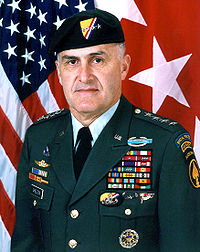 Henry H. Shelton, Former chairman of the U.S. Armed Forces Joint Chiefs of Staff
Henry H. Shelton, Former chairman of the U.S. Armed Forces Joint Chiefs of Staff
NC State has 156,297 living alumni with 61% of alumni living in North Carolina.[12] There are 100 alumni clubs in North Carolina and another 42 states also have active clubs. In addition to alumni, the university employs 2,040 faculty and 5,843 staff. A number of NC State alumni and faculty have made significant contributions in the fields of government, military, science, academia, business, arts, and athletics, among others.[74][75]
John Edwards, former U.S. Senator and two time presidential candidate, James B. Hunt Jr., 4-term Governor of North Carolina and Robert Gibbs, Former White House Press Secretary, are among the most notable alumni with involvement in politics.[76][77] Combining science and politics, Rajendra Kumar Pachauri is the elected chief of Intergovernmental Panel on Climate Change, an organization that shared the 2007 Nobel Peace Prize with Al Gore.[78]
Several alumni hold or have held top positions at large companies. These include: Caterpillar Inc. (James W. Owens), Thomasville Furniture Industries (Nancy Webster), DuPont (Ed Woolard), SAS Institute (James Goodnight), Citrix Systems (Mark Templeton) and MurFam Enterprises (Wendell Murphy).[75] Donald Bitzer, the father of Plasma Television and Emmy Award winner currently sits on the faculty of NC State.[79]
Over 50 NC State alumni have achieved the rank of Brigadier General or higher in the United States Military. The first four star officer at NCSU, General Maxwell R. Thurman, a former Vice Chief of Staff of the U.S. Army.[80] Hugh Shelton, now retired, was a former Chairman of the Joint Chiefs of Staff and a four star general.[81] General Dan McNeill currently commands the International Security Assistance Force in Afghanistan.[82] General William C. Lee is often referred to as the "Father of the U.S. Airborne."[83]
Some alumni have become national academic leaders. Albert Carnesale was the chancellor of UCLA from 1997 to 2006 after a 23 year tenure at Harvard University.[84] Bill Friday served as president of the University of North Carolina system for 30 years.[85] William Brantley Aycock served as chancellor of the University of North Carolina at Chapel Hill from 1957 until 1964.[86]
Several NC State students later became professional athletes. Bill Cowher coached 15 seasons with the Steelers including the Super Bowl XL championship team and he currently is a studio analyst for The NFL Today.[87] Over 130 NC State alumni play or have played in the NFL. Notable former players include Torry Holt, Roman Gabriel, Ted Brown, Dick Christy, Haywood Jeffires, Dr. Jerry Punch, Jim Ritcher, Koren Robinson and Dewayne Washington. Notable current players include Adrian Wilson of the Arizona Cardinals, Jerricho Cotchery of the New York Jets, #1 pick Mario Williams and Anthony Hill who play for the Houston Texans, Tank Tyler of the Carolina Panthers, Stephen Tulloch of the Detroit Lions and Philip Rivers who plays for the San Diego Chargers.[88] Another 41 alumni have played for the NBA including hall of famer David Thompson and players Tom Gugliotta, Kenny Carr, Spud Webb, Cedric Simmons, Julius Hodge, J.J. Hickson, Josh Powell, and Thurl Bailey. Former players Nate McMillan and Vinny Del Negro are current NBA head coaches.[89]
Actor and Comedian Zach Galifianakis also attended NC State University.[90]
See also
References
- ^ As of July 1, 2010. "NC State University Financial Report" (PDF). 2010 NC State University. NC State University Controller's Office. http://www.fis.ncsu.edu/controller/financial_reports/2010_Financial_Report.pdf. Retrieved July 18, 2010.
- ^ NCSU Brand – Web Standards
- ^ "NC State University Financial Report" (PDF). 2009 NC State University. NC State University Controller's Office. http://www.fis.ncsu.edu/controller/financial_reports/2009_Financial_Report.pdf. Retrieved November 21, 2010.
- ^ "The People's University at home and afar". North Carolina State University. http://www.ncsu.edu/about-nc-state/history/index.php. Retrieved September 29, 2009.
- ^ "GS 116-4". State of North Carolina. http://www.ncga.state.nc.us/enactedlegislation/statutes/html/bysection/chapter_116/gs_116-4.html. Retrieved 2008-06-25.
- ^ "University Administration". NCSU. http://www.ncsu.edu/about-nc-state/university-administration/index.php. Retrieved 2008-06-10.
- ^ "Sea Grant College text list". NOAA. http://www.seagrant.noaa.gov/colleges/textlinks.html/index.php. Retrieved 2008-06-10.[dead link]
- ^ "National Directory of Space Grant Contacts". NASA. http://www.nasa.gov/pdf/58251main_Space_Grants.pdf/index.php. Retrieved 2008-06-10.[dead link]
- ^ Data are for 2009. "NC State University Financial Report" (PDF). 2009 NC State University. NC State University Controller's Office. http://www.fis.ncsu.edu/controller/financial_reports/2009_Financial_Report.pdf. Retrieved November 21, 2010.
- ^ a b c "Historical Sketch of North Carolina State University". NC State Libraries. http://historicalstate.lib.ncsu.edu/histories/historical-sketch-of-north-carolina-state-university. Retrieved 2008-05-25.
- ^ "Quick Facts". NC State Centennial Campus Partnership Office. Archived from the original on April 15, 2008. http://web.archive.org/web/20080415182331/http://centennial.ncsu.edu/overview/quickFacts.html. Retrieved 2008-05-25.
- ^ a b "NC State University at a glance". NC State University Planning and Analysis. http://www.ncsu.edu/about-nc-state/quick-view/index.php. Retrieved 2008-05-25.
- ^ "2007 NACUBO Endowment Study" (PDF). National Association of College and University Business Officers. http://www.nacubo.org/Images/All%20Institutions%20Listed%20by%20FY%202007%20Market%20Value%20of%20Endowment%20Assets_2007%20NES.pdf. Retrieved 2008-05-25.
- ^ "Campus History". NC State Facilities Division. http://www.ncsu.edu/facilities/campus_history/index.htm. Retrieved 2008-05-25.
- ^ "Traditions: Brickyard". NC State New Student Orientation. http://www.ncsu.edu/nso/traditions/campus/brickyard/brickyard.htm. Retrieved 2008-05-25.
- ^ "Belltower Celebrations". NC State Office of the Chancellor. Archived from the original on 2006-09-12. http://web.archive.org/web/20060901090821/chancellor.ncsu.edu/belltower.html.
- ^ "Memorial Bell Tower". NC State Facilities Division. http://www.ncsu.edu/facilities/buildings/tower.html. Retrieved 2008-05-25.
- ^ Pittner, Danielle (2006-05-25). "Free Expression Tunnel open". Technician. http://media.www.technicianonline.com/media/storage/paper848/news/2006/05/25/News/Free-Expression.Tunnel.Open-2013899.shtml. Retrieved 2008-05-25.
- ^ Shibley, Robert (2008-11-24). "Free Expression Tunnel". FIRE. http://www.thefire.org/index.php/article/9967.html. Retrieved 2009-01-31.
- ^ "Centennial Campus Overview.". http://centennial.ncsu.edu/overview/ourPurpose.html.
- ^ "JC Raulston Arbortum self description.". http://www.ncsu.edu/jcraulstonarboretum/.
- ^ "NCSU Sustainability: History of Campus Sustainability". NC State University. http://www.ncsu.edu/sustainability/history.php. Retrieved 2009-06-08.
- ^ a b "NCSU Sustainability: Energy & Climate". NC State University. http://www.ncsu.edu/sustainability/energy_climate.php#. Retrieved 2009-06-08.
- ^ "NCSU Sustainability: Dining". NC State University. http://www.ncsu.edu/sustainability/dining.php. Retrieved 2009-06-08.
- ^ "College Sustainability Report Card 2009". Sustainable Endowments Institute. http://www.endowmentinstitute.org/. Retrieved 2009-06-08.
- ^ "University of North Carolina Board of Governors". University of North Carolina System. 2006-04-06. http://www.northcarolina.edu/content.php/bog/index.htm. Retrieved 2007-06-04.
- ^ "Erskine Bowles" (PDF). University of North Carolina. 2007-04-01. http://intranet.northcarolina.edu/docs/pres/erskine/3.1.07_erskine_bowles_bio_narrative.pdf. Retrieved 2007-06-04.
- ^ "NC State Board of Trustees". North Carolina State University. http://chancellor.ncsu.edu/trustees/. Retrieved 2007-05-05.
- ^ "Dr. James L. Oblinger Biography". North Carolina State University. 2007-01-23. http://chancellor.ncsu.edu/biography.html. Retrieved 2007-05-05.
- ^ "AGI Curriculum". NCSU. http://harvest.cals.ncsu.edu/aginstitute/index.cfm?pageID=1123. Retrieved January 12, 2010.
- ^ "North Carolina State University Institutional Profile" (PDF). University of North Carolina. http://intranet.northcarolina.edu/docs/assessment/Profiles/2006-07/Inst.Prof._2006NCSU.pdf. Retrieved 2007-06-05.
- ^ "NC State Co-Op Employer Information". http://www2.ncsu.edu/ncsu/co-op_ed/employ.html. Retrieved 2007-06-05.
- ^ "GE Foundation Makes $500,000 Grant to North Carolina State University to Help Diverse Students Realize Math Potential.". U.S. Newswire. 2004-01-04. http://www.highbeam.com/doc/1G1-112100264.html. Retrieved 2007-06-05.
- ^ "NC State". CollegeBoard. http://collegesearch.collegeboard.com/search/CollegeDetail.jsp?collegeId=614&profileId=1. Retrieved June 2009.
- ^ "Colleges and Careers". Princeton Review. 2006. http://www.princetonreview.com/college/research/profiles/admissions.asp?listing=1022851<ID=1&intbucketid=. Retrieved 2007-06-05.
- ^ "Carnegie Classifications". The Carnegie Foundation for the Advancement of Teaching. 2002. http://www.carnegiefoundation.org/classifications/sub.asp?key=748&subkey=15570&start=782. Retrieved 2007-06-01.
- ^ "North Carolina State University Profile". University of North Carolina System. http://www.northcarolina.edu/content.php/assessment/reports/profiles/current.htm. Retrieved 2005-11-23.
- ^ "NC State Common Data Set". North Carolina State University. http://www2.acs.ncsu.edu/UPA/commondata/. Retrieved November 23, 2005.
- ^ McNichol, Beth. "The Right Stuff: Getting in at NC State" (PDF). NC State Magazine Summer 2005. http://www.alumni.ncsu.edu/media/magpdfs/summer05.pdf. Retrieved 2006-07-20.
- ^ "Annual Report for the Graduate School: 2005–06". North Carolina State University. http://www.fis.ncsu.edu/grad_publicns/reports/anrp05-06.htm. Retrieved September 8, 2006.[dead link]
- ^ "About the Libraries: NCSU Libraries". http://www.lib.ncsu.edu/administration/aboutthelibraries.html. Retrieved November 23, 2005.[dead link]
- ^ "Association of Research Libraries". http://www.arl.org/. Retrieved November 23, 2005.
- ^ "D.H. Hill Library". http://www.ncsu.edu/facilities/buildings/dhhill.html. Retrieved November 23, 2005.
- ^ "NCSU Libraries Fact Sheet: NCSU Libraries". http://www.lib.ncsu.edu/publications/factsheet/factsheet.html. Retrieved November 23, 2005.[dead link]
- ^ "National Universities Rankings". America's Best Colleges 2012. U.S. News & World Report. September 13, 2011. http://colleges.usnews.rankingsandreviews.com/best-colleges. Retrieved September 25, 2011.
- ^ "NC State Official Data Used in Rankings". http://www2.acs.ncsu.edu/UPA/commondata/. Retrieved November 23, 2005.
- ^ ARWU2005PubData.xls
- ^ http://www.globaluniversitiesranking.org/images/banners/top-100(eng).pdf
- ^ "Kiplinger's Personal Finance 100 Best Values in Public Colleges". http://content.kiplinger.com/tools/colleges/pubcollege.php?sortby=INRANK04&orderby=flip&states%5B%5D=ALL&myschool%5B%5D=none&outputby=table.
- ^ "NC State Ranked Second in National 'Best Value' List". http://www.ncsu.edu/news/press_releases/06_03/056.htm. Retrieved April 2, 2006.
- ^ "College on The Princeton Review". http://www.princetonreview.com/college. Retrieved November 23, 2005.
- ^ US News Best Value
- ^ "The Top 25 Recruiter Picks". The Wall Street Journal. 2010-09-13. http://online.wsj.com/article/SB10001424052748704554104575435563989873060.html.
- ^ [1]
- ^ Selection Criteria
- ^ Doyel, Gregg (25 September 2001). "A new perspective on Wolfpack-Heels rivalry.". The Charlotte Observer. http://www.accessmylibrary.com/coms2/summary_0286-7851811_ITM. Retrieved 2008-06-13.
- ^ Fellenzer, JEFF (March 21, 1989). "TAKING A TRIP DOWN TOBACCO ROAD North Carolina Basketball Isn't a Game, It's a State of Mind.". LA Times. http://pqasb.pqarchiver.com/latimes/access/66421603.html?dids=66421603:66421603&FMT=ABS&FMTS=ABS:FT&date=Mar+21%2C+1989&author=JEFF+FELLENZER&pub=Los+Angeles+Times+(pre-1997+Fulltext)&desc=TAKING+A+TRIP+DOWN+TOBACCO+ROAD+North+Carolina+Basketball+Isn't+a+Game%2C+It's+a+State+of+Mind&pqatl=google. Retrieved 2008-06-13.
- ^ a b "Timeline of Athletics at NCSU". NC State University. http://www.lib.ncsu.edu/universityarchives/historicalstate/athleticstimeline.html. Retrieved 2008-06-13.
- ^ "RBC Center Description.". http://www.rbccenter.com/CommentAndFAQ/faq.asp.
- ^ "Carter-Finley Stadium Description.". http://www.ncsu.edu/facilities/buildings/carter-finley.html.
- ^ "African American Cultural Center at NCSU". Archived from the original on 2007-02-08. http://web.archive.org/web/20070208102854/http://www.ncsu.edu/aacc/index.php.
- ^ "Inter-Residence Council.". http://www.ncsu.edu/irc.
- ^ "University Housing Residence Halls.". http://www.ncsu.edu/housing/halls/index.php.
- ^ "Description of the NC State Student Government.". http://students.ncsu.edu/home/overview.php.
- ^ "NC State's Judicial Branch.". http://students.ncsu.edu/judicial/index.php.
- ^ "Service NC State- Center for Student Leadership, Ethics, & Public Service". http://www.ncsu.edu/csleps/service/servicenc.htm.
- ^ "Homecoming events finish in full swing". http://media.www.technicianonline.com/media/storage/paper848/news/2007/10/26/News/Homecoming.Events.Finish.In.Full.Swing-3058972.shtml.
- ^ "Shack-A-Thon at NCSU". http://www.ncsu.edu/stud_orgs/habitat/doShack.php.
- ^ "102 More Things You Gotta Do Before You Graduate (South)". SI On Campus. 2005-09-27.
- ^ "Krispy Kreme Challenge"
- ^ "About Us". Technician. Archived from the original on 2008-02-01. http://web.archive.org/web/20080201162826/http://www.technicianonline.com/about/. Retrieved 2008-05-25.
- ^ "Agromeck Yearbook History". NC State Student Media. http://www.ncsu.edu/agromeck/history.htm. Retrieved 2008-05-25.[dead link]
- ^ Teel, Mark. "The history of WKNC". WKNC 88.1: The Revolution. Archived from the original on April 24, 2008. http://web.archive.org/web/20080424053325/http://wknc.org/about/history.php. Retrieved 2008-05-25.
- ^ "NC State Alumni". NC State University. http://www.ncsu.edu/alumni/index.php. Retrieved 2008-06-11.
- ^ a b "NC State Notable Alumni". NC State University. Archived from the original on 2007-10-18. http://web.archive.org/web/20071018130847/http://ncsu.edu/alumni/prominent-alumni/index.php. Retrieved 2008-06-11.
- ^ "John Edwards Biography". Biography.com. http://www.biography.com/search/article.do?id=11158797. Retrieved 2008-06-11.
- ^ "James B. Hunt" (PDF). US Department of Education. http://www.ed.gov/about/bdscomm/list/hiedfuture/bios/hunt.pdf. Retrieved 2008-06-11.
- ^ "Alumnus Shares 2007 Nobel Peace Prize". NC State University. http://www.ncsu.edu/featured-stories/intl-connections/oct-2007/nobel-prize/index.php. Retrieved 2008-06-11.
- ^ "ECE Alumni Win Emmy". University of Illinois at Urbana-Champaign. http://www.engr.uiuc.edu/communications/outlook/Text%2042-1-2/dev.emmy.htm. Retrieved 2008-06-11.
- ^ "Military Ties". NC State Alumni Association. http://www.alumni.ncsu.edu/military/officers.php. Retrieved 2008-06-11.
- ^ "General Hugh Shelton Elected to Red Hat Board of Directors". Red Hat, Inc.. April 30, 2003. http://www.redhat.com/about/presscenter/2003/press_shelton.html. Retrieved 2008-06-11.
- ^ "General Dan K McNeill". North Atlantic Treat Organization. 27 August 2007. http://www.nato.int/isaf/structure/bio/comisaf/mcneill.html. Retrieved 2008-06-11.
- ^ "Aviation: From Sand Dunes to Sonic Booms". National Park Service. http://www.nps.gov/history/nr/travel/aviation/lee.htm. Retrieved 2008-06-11.
- ^ "Albert Carnesale". UCLA. http://www.pastleaders.ucla.edu/carnesale.html. Retrieved 2008-06-11.
- ^ "William Friday". UNC-TV. http://www.unctv.org/biocon/wfriday/. Retrieved 2008-06-11.
- ^ "William Aycock". UNC Library. http://www.lib.unc.edu/mss/inv/a/Aycock,William_B.html. Retrieved 2008-06-11.
- ^ "Bill Cowher Profile". Scout.com. http://pit.scout.com/a.z?s=68&p=8&c=1&nid=1151563. Retrieved 2008-06-11.
- ^ "NFL Players who attended North Carolina State University". Database Football. http://www.databasefootball.com/players/bycollege.htm?sch=North+Carolina+State+University. Retrieved 2008-06-11.
- ^ "NBA/ABA Players who attended North Carolina State University". Basketball Reference. http://www.basketballreference.com/players/bycollege.htm?sch=North+Carolina+State+University. Retrieved 2008-06-11.
- ^ http://en.wikipedia.org/wiki/Zach_Galifanakis
External links
- North Carolina State University (official website)
- GoPack.com (official athletics website)
- Historical State (historical timeline, photos, and other resources)
- Centennial Campus
- Golden LEAF Biomanufacturing Training and Education Center (BTEC)
University of North Carolina system Universities 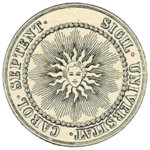
High School Affiliates NC Arboretum • NCCAT • NCCIU • NCCN • NCSAA • NCSEAA • UNC Center for Public Television • UNC Press
Administration Atlantic Coast Conference Atlantic Division Boston College Eagles • Clemson Tigers • Florida State Seminoles • Maryland Terrapins • North Carolina State Wolfpack • Wake Forest Demon Deacons
Coastal Division Future members Pittsburgh Panthers (TBA) • Syracuse Orange (TBA)
Championships & awards Conference champions • National championships • Athlete of the Year
Categories:- North Carolina State University
- Land-grant universities and colleges
- Oak Ridge Associated Universities
- Association of Public and Land-Grant Universities
- Educational institutions established in 1887
- Universities and colleges in the Research Triangle, North Carolina
- Universities and colleges in North Carolina
- University of North Carolina
- Universities and colleges in Raleigh, North Carolina
Wikimedia Foundation. 2010.

